7 Key Components of Agent in AI for Effective Implementation
Explore the essential components of agent in AI for effective implementation and enhanced productivity.

Key Highlights:
- SwarmZero is an AI marketplace that allows businesses to create, deploy, and monetize custom AI solutions.
- The platform features a Creator for automating tasks like sales proposals and content management, integrating with tools like Salesforce and Google Drive.
- AI agents consist of perception, reasoning, and action modules, essential for effective autonomous operation.
- Perception modules collect data, reasoning modules analyse it, and action modules execute decisions, enhancing productivity.
- Learning mechanisms, especially reinforcement learning, enable AI agents to adapt and improve over time.
- AI systems are categorised into simple reflex systems and learning agents, with the latter offering greater adaptability in dynamic environments.
- Challenges in deploying AI include data privacy, integration issues, and maintenance needs; proactive strategies can mitigate these risks.
- Best practises for AI implementation include defining clear objectives, involving stakeholders, and providing comprehensive training.
- AI agents are transforming industries by automating tasks, improving efficiency, and allowing human resources to focus on strategic initiatives.
- Ethical considerations in AI deployment involve addressing data privacy, algorithmic bias, and accountability, requiring clear guidelines.
- Future trends in AI include advancements in natural language processing and machine learning, enabling more autonomous and collaborative AI systems.
Introduction
The rapid evolution of artificial intelligence has ushered in a new era where AI agents are becoming indispensable across various industries. These sophisticated systems, characterised by their ability to perceive, reason, and act, present businesses with the opportunity to streamline operations and enhance productivity.
Nevertheless, the implementation of AI agents is not without challenges, raising critical questions about their architecture, effectiveness, and ethical implications. How can organisations harness the full potential of AI agents while navigating the complexities of deployment and ensuring responsible use?
This article delves into the key components of AI agents, offering insights into best practises for effective implementation and exploring the transformative impact they have on modern business landscapes.
SwarmZero: The Comprehensive AI Agent Marketplace for Custom Solutions
SwarmZero emerges as a comprehensive AI marketplace, empowering businesses to create, deploy, and monetize AI solutions tailored to their specific needs. The platform features an intuitive Creator, allowing users to design entities that automate essential tasks, such as generating personalised sales proposals and managing content creation. Furthermore, the integration of the Tavily API significantly enhances web search capabilities, delivering AI-powered processing that boosts productivity. Notably, SwarmZero seamlessly integrates with widely used tools like Salesforce and Google Drive, establishing itself as an indispensable resource for organisations eager to leverage AI effectively.
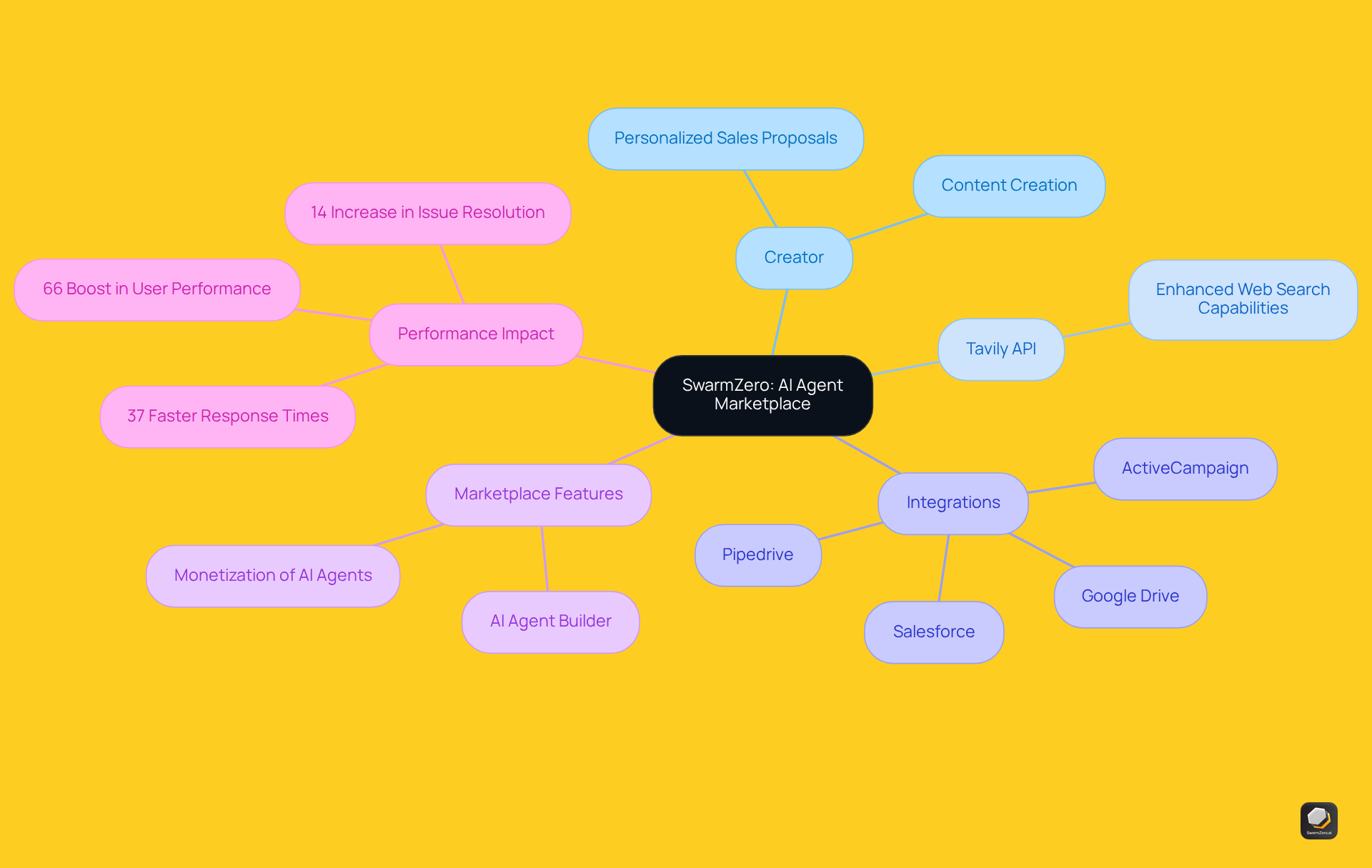
Core Components of AI Agents: Perception, Reasoning, and Action Modules
AI systems are fundamentally structured around the components of agent in AI, which include three essential elements: perception, reasoning, and action modules. The perception module enables the collection of information from the environment, utilising sensors to identify changes and gather pertinent details. For example, AI systems can autonomously monitor inventory levels, notifying supply chain managers when stocks are low and even initiating reorders. This capability exemplifies how perception modules facilitate proactive decision-making.
The reasoning module processes the gathered data, allowing for analysis of situations and informed choices based on objectives and context. This is crucial for activities such as creating customised sales proposals or automating content production, where representatives must assess various factors to achieve optimal results.
Finally, the action module executes the decisions made by the entity, translating reasoning into tangible actions. This could involve updating a CRM system with new customer insights or managing project timelines based on real-time data. The seamless integration of the components of agent in AI is vital for organisations aiming to implement AI systems effectively, as it directly influences the system's capacity to function independently and enhance productivity.
Insights from AI experts underscore the significance of the components of agent in AI in shaping the future of work. As AI systems evolve, their ability to perceive, reason, and act independently will redefine operational efficiency across sectors, enabling businesses to focus on strategic initiatives while intelligent systems manage routine tasks.
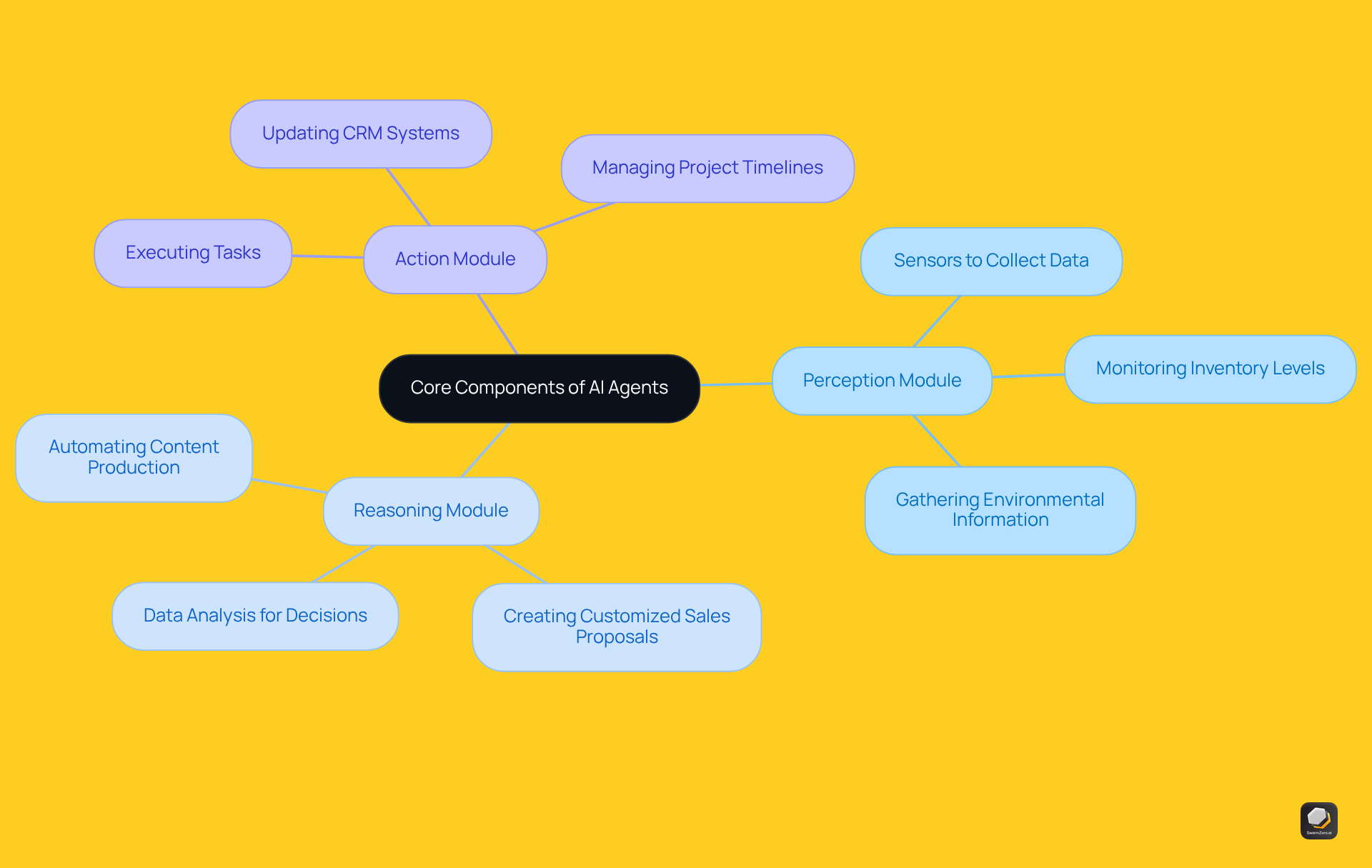
Learning Mechanisms in AI Agents: Continuous Improvement and Adaptation
Learning mechanisms are essential components of agents in AI, enabling them to continuously enhance their capabilities and adapt to evolving information. Reinforcement learning, a pivotal method in this domain, enables entities to glean insights from their interactions and experiences, leading to improved performance over time. This adaptability is vital in dynamic environments where user needs and market conditions are in constant flux, ensuring that AI systems remain effective and relevant.
As we approach 2025, the focus on reinforcement learning intensifies, with researchers developing algorithms that significantly boost the training efficiency of AI systems. For example, the Model-Based Transfer Learning (MBTL) algorithm has proven capable of achieving performance levels on par with traditional methods while requiring substantially less training data—sometimes as few as two tasks instead of a hundred. This efficiency not only reduces costs but also accelerates the deployment of AI systems in real-world applications.
Moreover, the shift towards viewing AI entities as active collaborators rather than mere tools highlights the significance of the components of agents in AI and robust learning mechanisms. As AI systems increasingly operate with minimal human intervention, their ability to learn and adapt becomes paramount. This evolution is evident in the growing emphasis on developing multi-entity systems, where specialised units collaborate to tackle complex challenges, thereby enhancing their effectiveness across various domains.
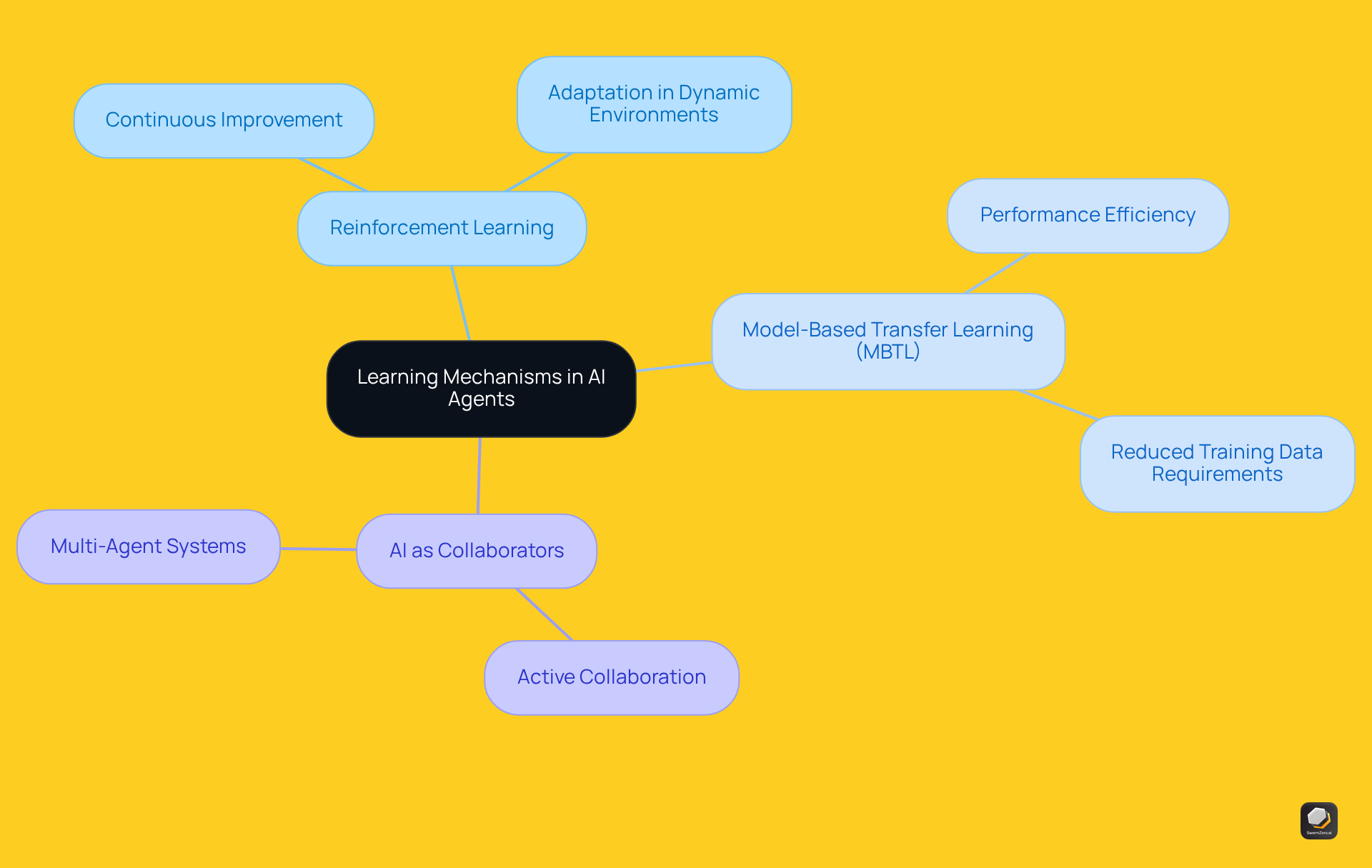
Types of AI Agents: From Simple Reflex to Learning Agents
AI systems can be categorised into various groups, with simple reflex systems and learning systems representing two fundamental types. Basic reflex entities function according to established guidelines, reacting directly to particular stimuli without considering previous experiences or future outcomes. For instance, a thermostat that modifies temperature based solely on current readings exemplifies this type of system. In contrast, learning entities utilise algorithms to adjust and enhance their performance over time, making them more suitable for dynamic environments. These representatives can examine data, gain knowledge from interactions, and enhance their decision-making processes, which is especially advantageous in intricate applications like customer support and autonomous systems.
Organisations employing various forms of AI systems have reported significant enhancements in operational efficiency. Companies utilising learning systems in customer support have experienced improved user interactions, thanks to their capability to deliver contextually relevant replies based on prior conversations. This adaptability stands in stark contrast to basic reflex systems, which may struggle in settings demanding nuanced understanding and flexibility.
Comprehending the components of agent in AI is crucial for organisations seeking to implement AI effectively. By choosing the suitable representative according to their operational needs, businesses can enhance their workflows and attain improved results.
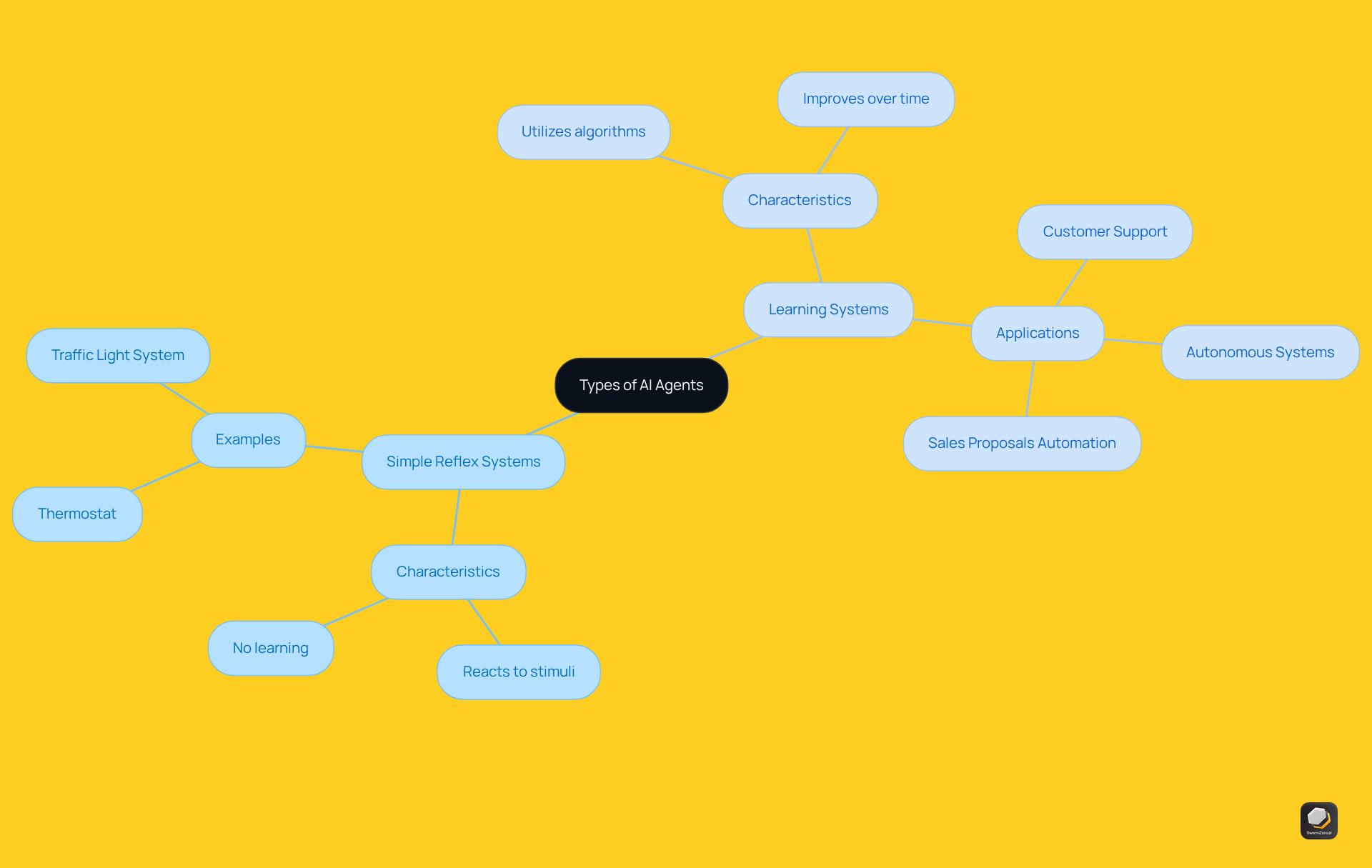
Challenges in Deploying AI Agents: Risks and Considerations
Implementing AI entities presents a range of challenges, notably:
- Data privacy concerns
- Integration issues with existing systems
- The necessity for ongoing maintenance
Organisations must carefully assess these risks to prevent potential setbacks. A well-defined implementation strategy, which includes:
- Rigorous testing
- Comprehensive user training
can significantly mitigate these challenges. Such proactive measures are essential for ensuring a smoother deployment process.
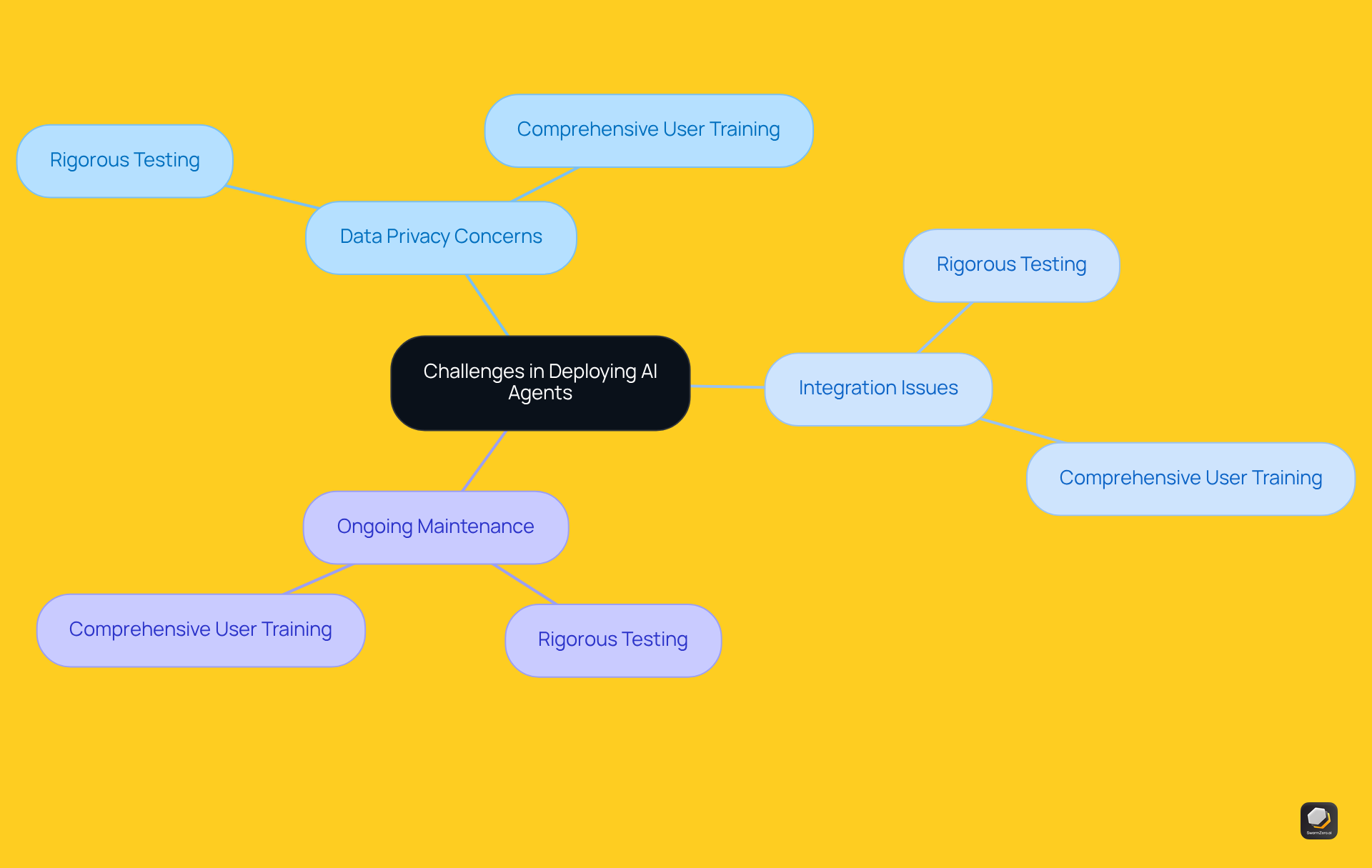
Best Practices for Implementing AI Agents: Strategies for Success
For the successful execution of AI systems, entities must adopt best practices, which include:
- Defining clear objectives
- Actively involving stakeholders throughout the development process
- Ensuring comprehensive training for users
Involving stakeholders not only promotes support but also leverages varied perspectives that can enhance the design and functionality of AI systems. Ongoing observation and the establishment of feedback systems are essential for performance enhancement, enabling organisations to adapt to evolving requirements and improve efficiency. As Prakash Nagarajan emphasises, "Employee buy-in and readiness to adopt new technology are crucial." By implementing these strategies, companies can significantly enhance the efficiency of their AI systems, ultimately achieving their business objectives and fostering innovation.
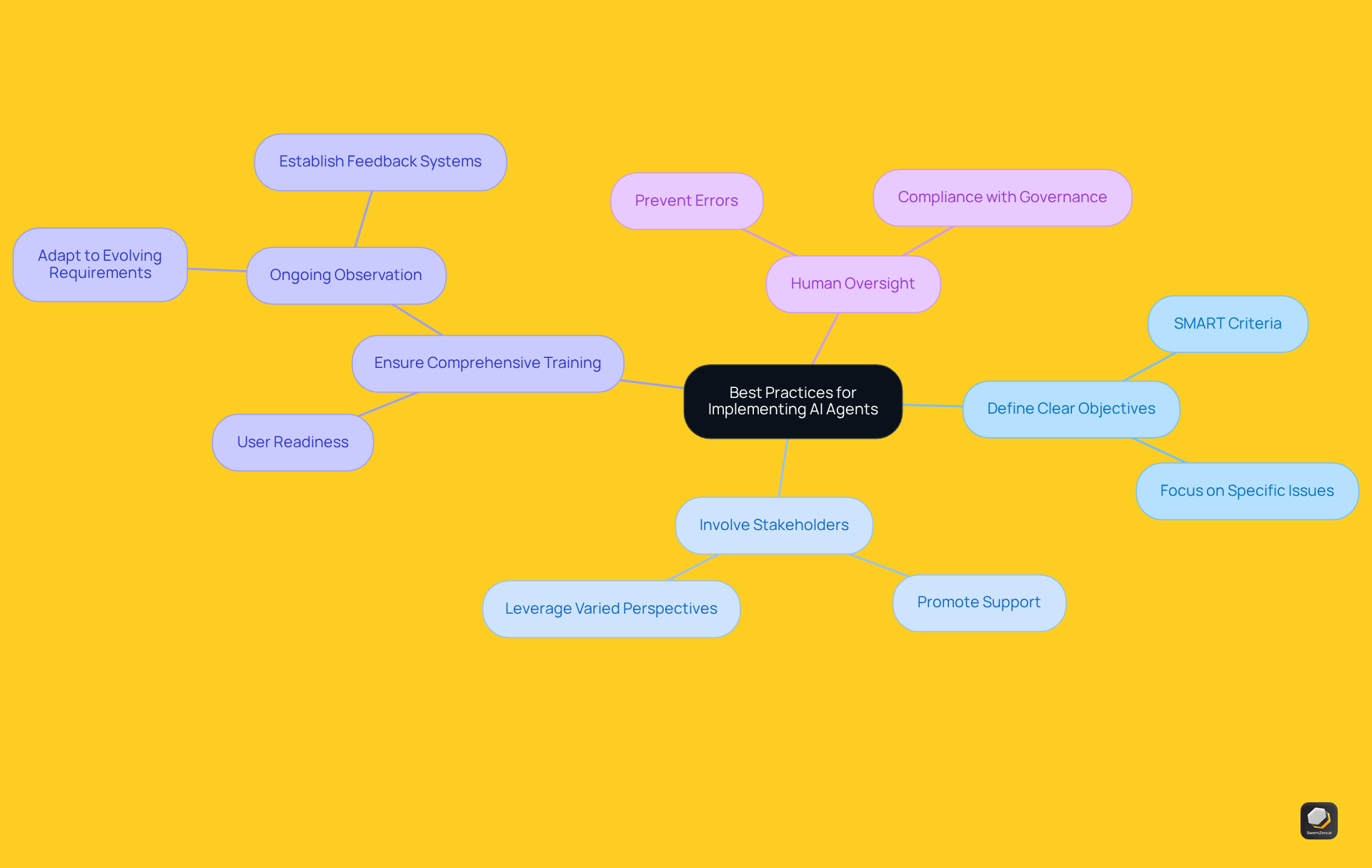
Real-World Applications of AI Agents: Transforming Industries
AI systems are fundamentally transforming sectors by automating tasks and enhancing efficiency. In marketing, for instance, these systems can create personalised content and oversee customer interactions, enabling human resources to concentrate on strategic initiatives. Similarly, in the finance industry, AI systems streamline transaction validation and bolster fraud detection, leading to a significant reduction in risk factors.
Recent data indicates that businesses implementing AI systems can enhance their operational capacity threefold without additional personnel, underscoring the versatility and potential of AI technologies to revolutionise various sectors. As we approach 2025, the integration of AI systems is expected to accelerate, with 90% of IT leaders recognising their capability to improve business processes. This trend accentuates the imperative for enterprises to adopt AI solutions to remain competitive and enhance customer experiences.
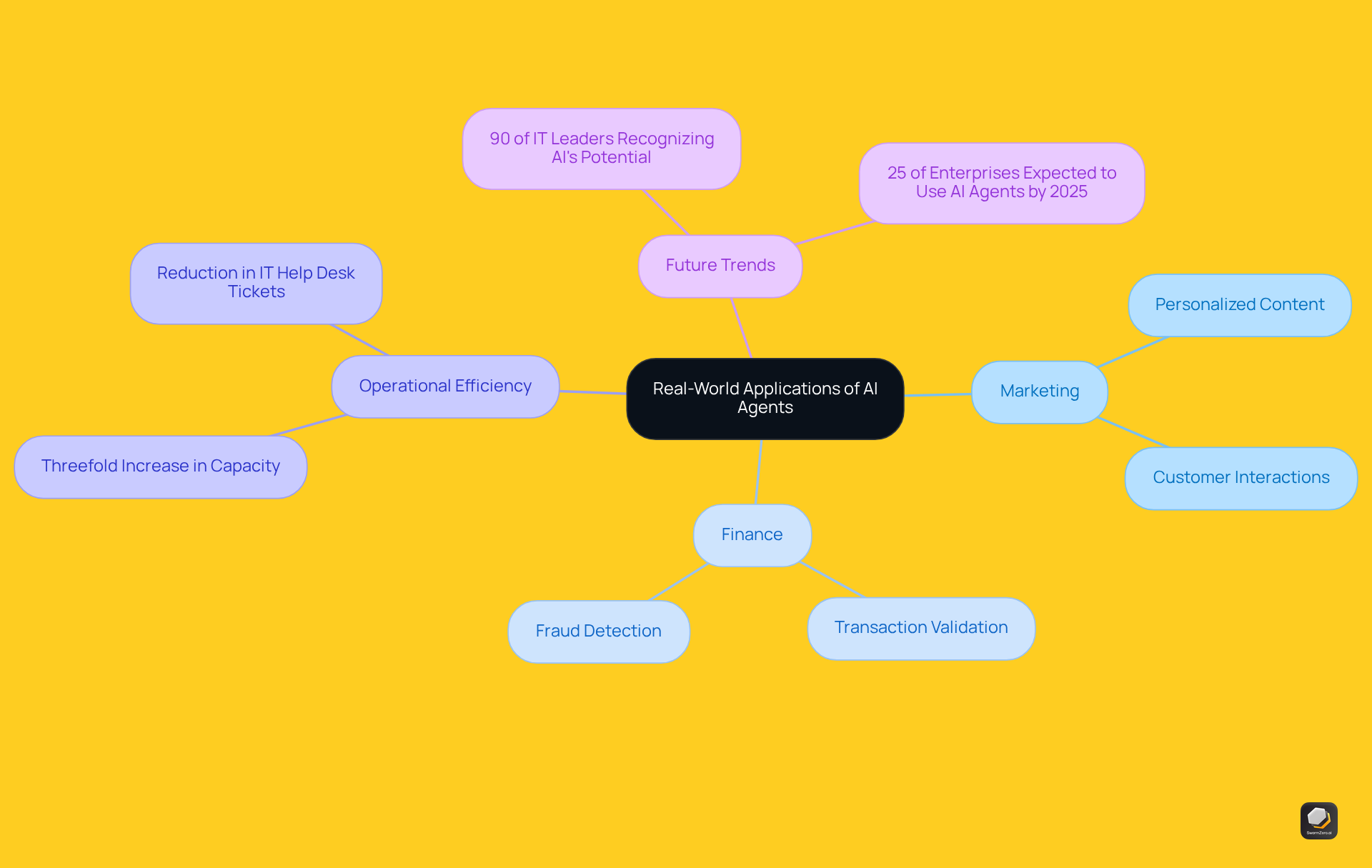
Ethical Considerations in AI Agents: Navigating Responsibility
As organisations implement AI systems, ethical considerations must be prioritised within their strategies. Key concerns, including data privacy, algorithmic bias, and accountability for AI decision-making, are crucial to address. To foster trust with users and stakeholders, organisations should establish clear ethical guidelines and ensure transparency in their AI practises. Navigating these responsibilities is essential for cultivating a positive relationship with AI technology.
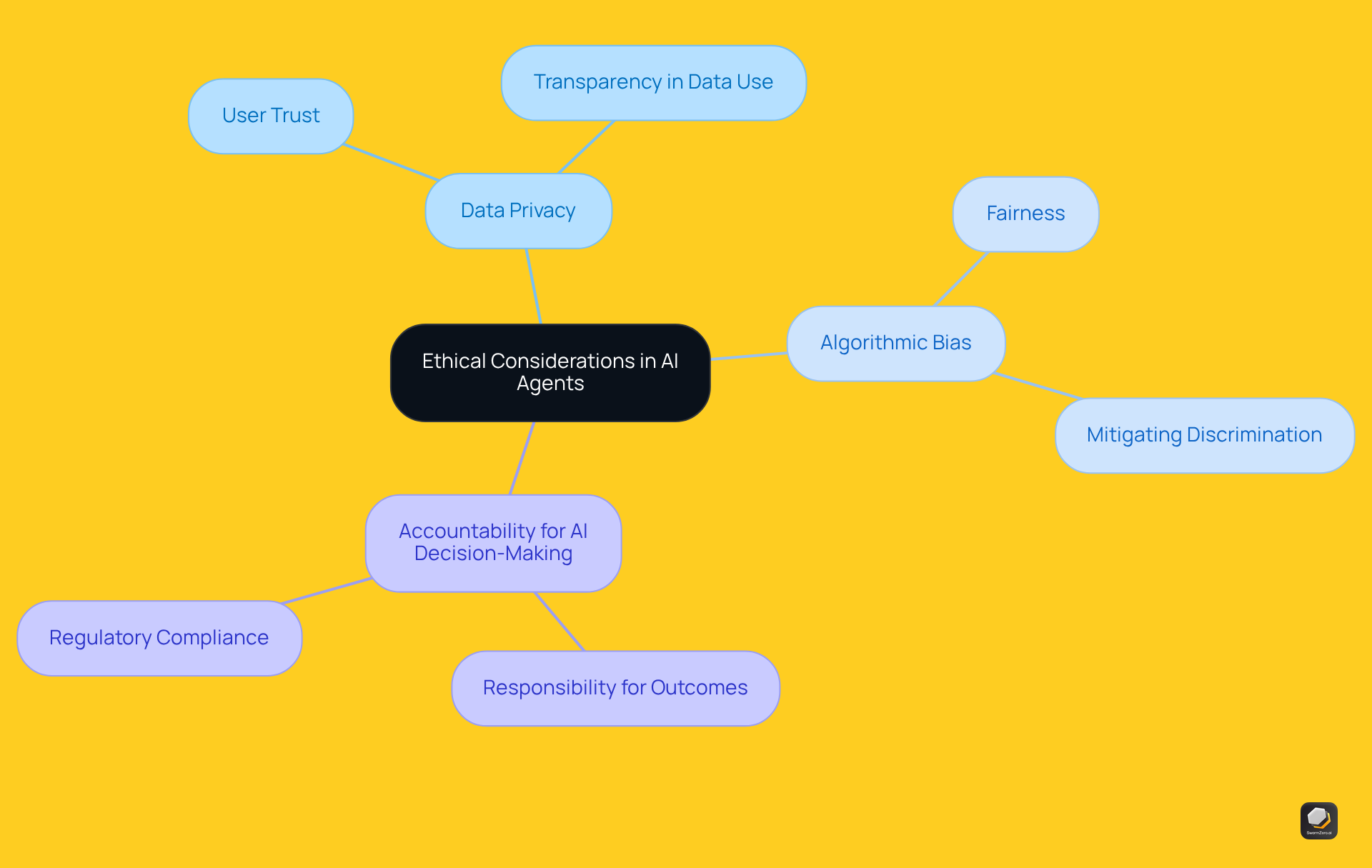
Future Trends in AI Agents: Innovations and Evolving Capabilities
The future of AI systems is set to be transformative, driven by significant advancements in natural language processing (NLP), machine learning algorithms, and integration capabilities. Enhanced NLP will empower AI systems, including those built on the SwarmZero framework utilising the Tavily API, to perform web searches with greater precision and fluidity, making interactions feel more natural and intuitive. The Tavily API specifically enhances these search capabilities by providing advanced algorithms that improve the relevance and context of search results. Notably, advancements in reasoning abilities are expected to bolster AI's capacity to tackle complex tasks, with forecasts indicating that by 2025, AI systems will independently oversee processes currently requiring human supervision.
Data reveals that 99% of developers are exploring or creating AI systems, underscoring a robust interest in these technologies. As organisations adopt these innovations, they can expect AI assistants to not only optimise operations but also enhance customer interactions through tailored engagements. The integration of advanced machine learning models within the SwarmZero framework will further enable AI systems to analyse data, predict trends, and automate workflows effectively.
By 2025, the landscape of AI technology will evolve significantly, with organisations employing a network of systems capable of operating autonomously or collaboratively to execute intricate processes. This shift will redefine productivity and problem-solving, allowing businesses to maintain a competitive edge in their respective industries. As AI continues to progress, the emphasis will be on developing the components of agent in AI that not only augment human capabilities but also function independently, ensuring that organisations are well-prepared for the future.
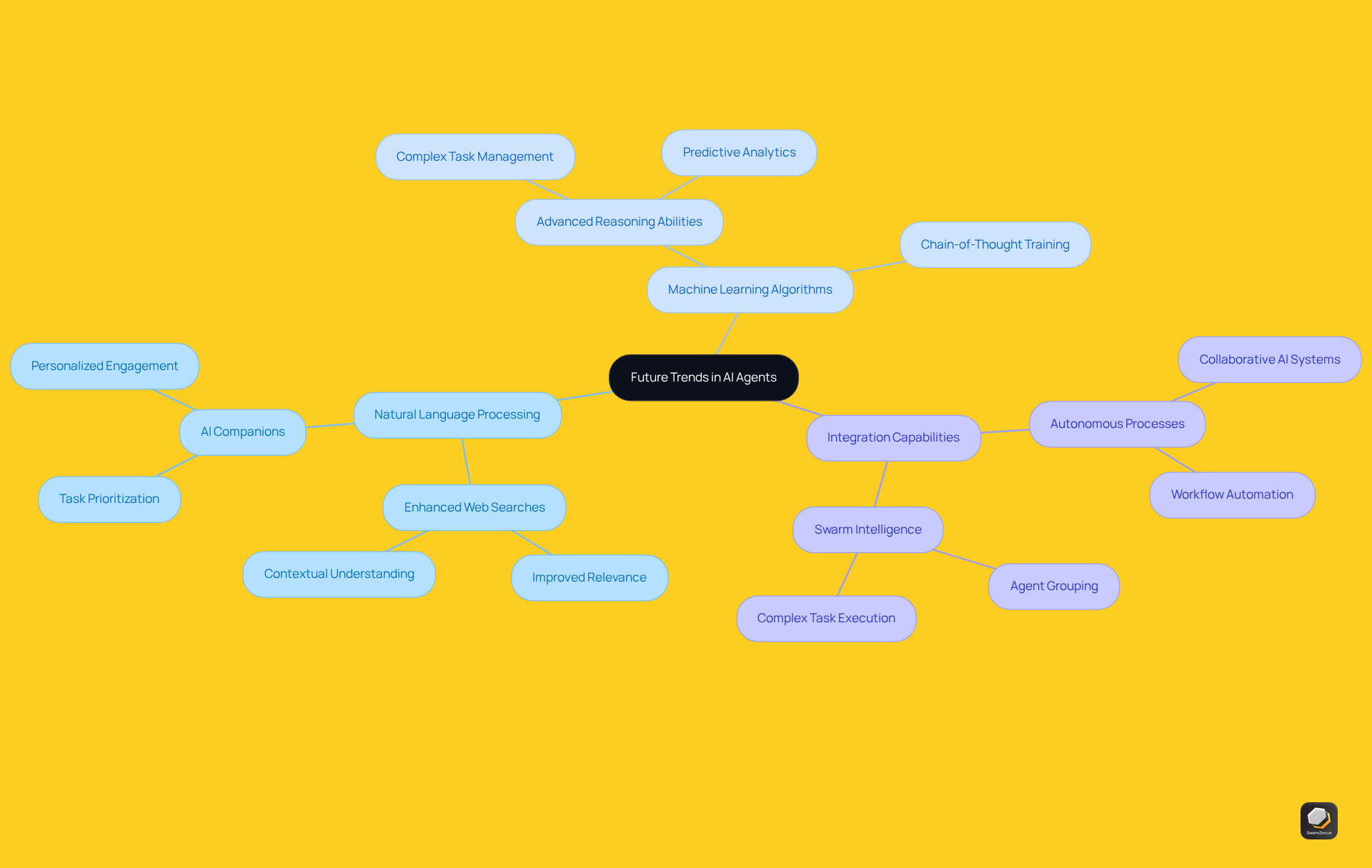
Conclusion
SwarmZero and the various components of AI agents mark a pivotal evolution in how businesses can harness technology for enhanced efficiency and productivity. By grasping the intricate architecture of AI agents—comprised of perception, reasoning, and action modules—organisations are better equipped to implement these systems effectively. The integration of learning mechanisms, such as reinforcement learning, further empowers AI agents to adapt and improve over time, ensuring their relevance in a rapidly changing environment.
Throughout this article, key insights have been shared regarding the types of AI agents, the challenges encountered during deployment, and best practises for successful implementation. From simple reflex agents to sophisticated learning systems, the capabilities of AI agents can significantly transform operational workflows across industries. Moreover, ethical considerations and future trends underscore the importance of responsible AI development and the potential for innovation that lies ahead.
As businesses continue to explore the vast possibilities of AI, embracing these technologies proactively is crucial. By prioritising ethical guidelines and focusing on continuous improvement, organisations can enhance their operational efficiency while fostering trust and collaboration with stakeholders. The future of AI agents is bright, and those who adapt and innovate will undoubtedly lead the charge in redefining industry standards and customer experiences.
Frequently Asked Questions
What is SwarmZero?
SwarmZero is a comprehensive AI marketplace that enables businesses to create, deploy, and monetize AI solutions tailored to their specific needs. It features an intuitive Creator for designing entities that automate tasks like generating personalised sales proposals and managing content creation.
How does SwarmZero enhance web search capabilities?
SwarmZero integrates the Tavily API, which significantly enhances web search capabilities by providing AI-powered processing that boosts productivity.
Which tools does SwarmZero integrate with?
SwarmZero seamlessly integrates with widely used tools such as Salesforce and Google Drive, making it an essential resource for organisations looking to leverage AI effectively.
What are the core components of AI agents?
The core components of AI agents include perception, reasoning, and action modules. The perception module collects information from the environment, the reasoning module processes that data for informed decision-making, and the action module executes the decisions made.
How does the perception module function in AI systems?
The perception module enables AI systems to collect information using sensors to identify changes in the environment, facilitating proactive decision-making, such as monitoring inventory levels and initiating reorders.
What role does the reasoning module play in AI agents?
The reasoning module processes gathered data, allowing AI systems to analyse situations and make informed choices based on objectives and context, which is crucial for tasks like creating customised sales proposals.
What does the action module do in an AI system?
The action module executes decisions made by the AI entity, translating reasoning into tangible actions, such as updating a CRM system or managing project timelines based on real-time data.
What are learning mechanisms in AI agents?
Learning mechanisms, such as reinforcement learning, enable AI agents to continuously improve their capabilities and adapt to changing information, ensuring their effectiveness in dynamic environments.
What is the significance of reinforcement learning in AI?
Reinforcement learning allows AI entities to learn from their interactions and experiences, leading to improved performance over time. It is crucial for adapting to evolving user needs and market conditions.
What is the Model-Based Transfer Learning (MBTL) algorithm?
The MBTL algorithm is a method that enhances the training efficiency of AI systems, achieving performance levels similar to traditional methods while requiring significantly less training data.
How are AI entities viewed in the evolving landscape of technology?
There is a growing emphasis on viewing AI entities as active collaborators rather than mere tools, highlighting the importance of robust learning mechanisms and the components of agents in AI for effective operation with minimal human intervention.
List of Sources
- SwarmZero: The Comprehensive AI Agent Marketplace for Custom Solutions
- SwarmZero Price, Research, News & Fundraising | Messari (https://messari.io/project/swarm-zero)
- What is SwarmZero? | Messari (https://messari.io/project/swarm-zero/profile)
- SwarmZero - Crunchbase Company Profile & Funding (https://crunchbase.com/organization/swarmzero)
- AI Agent Statistics for 2025: Adoption, ROI, Performance & More (https://plivo.com/blog/ai-agents-top-statistics)
- SwarmZero | AI Agent Marketplace (https://swarmzero.ai)
- Core Components of AI Agents: Perception, Reasoning, and Action Modules
- AI Agents (https://bcg.com/capabilities/artificial-intelligence/ai-agents)
- The rise of ‘AI agents’: What they are and how to manage the risks | eTrade for all (https://etradeforall.org/news/rise-ai-agents-what-they-are-and-how-manage-risks)
- AI agents — what they are, and how they'll change the way we work - Source (https://news.microsoft.com/source/features/ai/ai-agents-what-they-are-and-how-theyll-change-the-way-we-work)
- Box Announces All-New AI Platform to Bring Powerful AI Agents to Enterprise Content (https://businesswire.com/news/home/20250515232556/en/Box-Announces-All-New-AI-Platform-to-Bring-Powerful-AI-Agents-to-Enterprise-Content)
- Cloudflare Accelerates AI Agent Development With The Industry's First Remote MCP Server (https://finance.yahoo.com/news/cloudflare-accelerates-ai-agent-development-130000223.html)
- Learning Mechanisms in AI Agents: Continuous Improvement and Adaptation
- MIT researchers develop an efficient way to train more reliable AI agents (https://news.mit.edu/2024/mit-researchers-develop-efficiency-training-more-reliable-ai-agents-1122)
- AI Explained: AI Agents Are Quietly Taking Over Everyday Tasks | PYMNTS.com (https://pymnts.com/artificial-intelligence-2/2024/ai-explained-ai-agents-are-quietly-taking-over-everyday-tasks)
- New training approach could help AI agents perform better in uncertain conditions (https://news.mit.edu/2025/new-training-approach-could-help-ai-perform-better-0129)
- How AI Agents Will Shape 2025 | ASSIST Software (https://assist-software.net/news/how-ai-agents-will-shape-2025)
- Developments in AI Agents: Q1 2025 Landscape Analysis — The Science of Machine Learning & AI (https://ml-science.com/blog/2025/4/17/developments-in-ai-agents-q1-2025-landscape-analysis)
- Types of AI Agents: From Simple Reflex to Learning Agents
- What are AI agents and why do they matter? (https://github.blog/ai-and-ml/generative-ai/what-are-ai-agents-and-why-do-they-matter)
- Types of AI Agents | IBM (https://ibm.com/think/topics/ai-agent-types)
- Types of AI Agents: Choosing the Right One (https://automationanywhere.com/company/blog/automation-ai/exploring-ai-agents-types-capabilities-and-real-world-applications)
- Understanding And Preparing For The 7 Levels Of AI Agents (https://forbes.com/sites/douglaslaney/2025/01/03/understanding-and-preparing-for-the-seven-levels-of-ai-agents)
- 7 Main Types of AI Agents [with Examples] (https://botpress.com/blog/types-of-ai-agents)
- Challenges in Deploying AI Agents: Risks and Considerations
- Agentic AI deployment accelerates despite risks: KPMG (https://cfodive.com/news/agentic-ai-deployment-triples-despite-risks-kpmg/751789)
- AI agents pose new governance challenges — Schwartz Reisman Institute (https://srinstitute.utoronto.ca/news/challenges-in-governing-ai-agents)
- The critical challenges of AI agents (https://artmotion.eu/en/insights/blog/the-critical-challenges-of-ai-agents.html)
- Enterprises are worried about agentic AI security risks – Gartner says the answer is just adding more AI agents (https://itpro.com/technology/artificial-intelligence/enterprises-are-worried-about-agentic-ai-security-risks-gartner-says-the-answer-is-just-adding-more-ai-agents)
- AI Agents Move Beyond Experimentation as Leaders Prepare for Competitive Transformation Within 24 Months (https://kpmg.com/us/en/media/news/q2-ai-pulse-2025-agents-move-beyond-experimentation.html)
- Best Practices for Implementing AI Agents: Strategies for Success
- How to Implement AI Agents to Transform Business Models | Gartner (https://gartner.com/en/articles/ai-agents)
- AI Agent Best Practices and Ethical Considerations | Writesonic (https://writesonic.com/blog/ai-agents-best-practices)
- 7 Strategies To Get an Effective AI Agent Up and Running | Crowe LLP (https://crowe.com/insights/7-strategies-to-get-an-effective-ai-agent-up-and-running)
- Implementing AI Agents: Key Considerations and Strategies (https://quixl.ai/blog/implementing-ai-agents-key-considerations-and-strategies)
- How to Implement AI Agents: 8 Tips for Success – Aekot (https://blog.aekot.com/how-to-implement-ai-agents-8-tips-for-success)
- Real-World Applications of AI Agents: Transforming Industries
- How AI agents are being deployed in the real world (https://itpro.com/technology/artificial-intelligence/how-ai-agents-are-being-deployed-in-the-real-world)
- Agentic AI Set to Transform Industries in 2025: 4 Stocks to Watch (https://finance.yahoo.com/news/agentic-ai-set-transform-industries-162300683.html)
- How AI Agents are Transforming Businesses by 2025 (https://www2.inceptasolutions.com/how-ai-agents-are-transforming-businesses-by-2025)
- How AI agents could revolutionize the SOC — with human help (https://cybersecuritydive.com/news/artificial-intelligence-ai-agents-security-operations-center-gartner/750370)
- Daily AI Agent News - Last 7 Days (https://aiagentstore.ai/ai-agent-news/this-week)
- Ethical Considerations in AI Agents: Navigating Responsibility
- AI Generates Debate Over Newsroom Ethics (https://voanews.com/a/ai-generates-debate-over-newsroom-ethics-/7450743.html)
- The Ethical Challenges of AI Agents | Tepperspectives (https://tepperspectives.cmu.edu/all-articles/the-ethical-challenges-of-ai-agents)
- Concerns Around Ethical Risks of Generative AI Remain High Amid Increased Adoption: 'Deloitte State of Ethics and Trust in Technology' Report (https://prnewswire.com/news-releases/concerns-around-ethical-risks-of-generative-ai-remain-high-amid-increased-adoption-deloitte-state-of-ethics-and-trust-in-technology-report-302254593.html)
- Ethical concerns mount as AI takes bigger decision-making role (https://news.harvard.edu/gazette/story/2020/10/ethical-concerns-mount-as-ai-takes-bigger-decision-making-role)
- Newsrooms Are Already Using AI, But Ethical Considerations Are Uneven, AP Finds (https://forbes.com/sites/meglittlereilly/2024/04/22/newsrooms-are-already-using-ai-but-ethical-considerations-are-uneven-ap-finds)
- Future Trends in AI Agents: Innovations and Evolving Capabilities
- The Future of AI Agents: Top Predictions & Trends to Watch in 2025 (https://salesforce.com/news/stories/future-of-salesforce)
- AI Agents in 2025: Expectations vs. Reality | IBM (https://ibm.com/think/insights/ai-agents-2025-expectations-vs-reality)
- 6 AI trends you’ll see more of in 2025 (https://news.microsoft.com/source/features/ai/6-ai-trends-youll-see-more-of-in-2025)
- 7 Compelling AI Trends and News Stories (https://linkedin.com/pulse/7-compelling-ai-trends-news-stories-tom-treanor-r8s2c)
- Microsoft Build 2025: The age of AI agents and building the open agentic web - The Official Microsoft Blog (https://blogs.microsoft.com/blog/2025/05/19/microsoft-build-2025-the-age-of-ai-agents-and-building-the-open-agentic-web)




